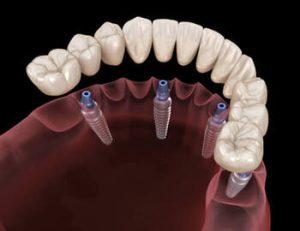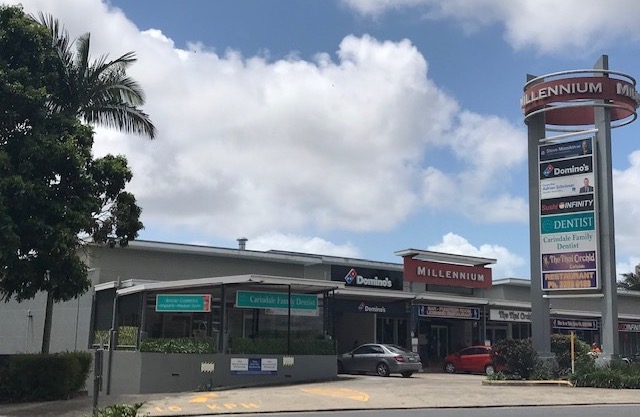The smile you deserve is within reach with full-arch dental implants. In this comprehensive guide, we will delve into the world of full-arch dental implants, also known as “All-on-4 dental implants” or “full-mouth dental implants”, and why they are hailed as a superior alternative to conventional dental implant procedures. From understanding the materials used to the intricacies of the implant procedure, we’ll explore the path to a complete and natural smile.
Additionally, we’ll address supplementary procedures that may be necessary for success and the critical importance of choosing a local dental implant professional over seeking dental implants overseas.
What Are Full-Arch Dental Implant Solutions?
For patients who need to replace all of their teeth or have missing teeth, full-arch dental implants are a revolutionary treatment. With just four dental implants, a whole dental arch may be restored thanks to this cutting-edge dentistry procedure. Full-arch dental implants offer a permanent solution, in contrast to traditional dentures, which may need adhesives and be less stable.
Why Full-Arch Dental Implants Triumph Over Conventional Procedures

Fewer Implant Fixtures
Conventional dental implant procedures, like single and multiple dental implants, typically require a higher number of implant fixtures to support a full set of teeth. In contrast, full-arch dental implants can accomplish the same goal with just four strategically placed implants. This streamlined approach minimises the complexity of the surgery and accelerates the healing process.
Reduced Bone Density Requirements
Full-arch dental implants are designed to work efficiently even in areas with reduced bone density. While traditional implants may necessitate bone grafting procedures to augment bone density, the full-arch technique is often successful without the need for extensive bone grafts, making it a more accessible option for many patients.
Rapid Dental Function Restoration
Patients who opt for full-arch dental implants experience a quicker restoration of dental function. You can enjoy the benefits of your new teeth sooner, allowing you to eat, speak, and smile with confidence in a relatively short timeframe.
Fixed Teeth, Enhanced Stability
Unlike removable dentures, full-arch implants provide a permanent and stable solution. The prosthetic teeth are securely affixed to the implants, eliminating the need for adhesives and the worry of slippage. This stability enhances both comfort and self-assurance.
Improved Oral Health And Hygiene
With full-arch implants, you can maintain excellent oral hygiene practices akin to those with natural teeth. There are no removable components, and cleaning your new teeth is as straightforward as regular brushing and flossing.
Preservation Of Facial Features
Loss of teeth can cause sunken eyes and jaw bone drooping, among other alterations in facial characteristics. In addition to fixing your smile, full-arch implants help maintain the youthful curves of your face and your facial structure.
Pain Medication And Discomfort Minimisation
The all-on-4 technique is designed to minimise discomfort during and after the procedure. Patients typically experience less pain and require less medication than with traditional dental implant surgeries, resulting in a more comfortable recovery process.
Advanced Dental Technology
Full-arch dental implant procedures leverage advanced dental technology to plan implant placement meticulously. This precision ensures optimal results and reduces the risk of complications.
The choice between conventional dental implant procedures and full-arch implants often comes down to a matter of efficiency, comfort, and overall patient experience. Full-arch implants have rapidly gained popularity for their ability to offer a more streamlined, accessible, and satisfying teeth replacement solution.
Materials Used In Full-Arch Dental Implants
The success and durability of full-arch dental implants are intrinsically linked to the materials used in their construction. Here, we delve into the key materials that make these remarkable dental solutions possible:
Titanium Dental Implants
Titanium has long been the material of choice for implants due to its biocompatibility and ability to fuse with natural bone tissue. The implant fixtures, typically made from medical-grade titanium, are precisely designed to anchor the prosthetic teeth securely. This titanium anchor forms a stable foundation for the replacement teeth.
Prosthetic Teeth
The prosthetic teeth used in full-arch implants are crafted with the utmost precision and attention to detail. These prosthetic teeth are designed not only to resemble natural teeth in appearance but also to function like them. Advanced materials such as porcelain or ceramic are often used for their remarkable strength, durability, and natural aesthetics.
Restorative Dentistry Materials

The choice of these materials is a testament to the precision and expertise that go into the creation of full-arch implants. Each component is carefully selected to ensure compatibility, stability, and long-term success. As a result, patients can enjoy the benefits of a complete smile that not only looks natural but also functions seamlessly.
The Full-Arch Dental Implant Procedure
The full-arch dental implant procedure is a meticulously planned and executed process designed to restore your smile with precision and efficiency. Here, we provide a detailed overview of the steps involved in this transformative dental treatment:
Comprehensive Evaluation
The journey to full-arch implants begins with a comprehensive evaluation by a skilled implant dentist. During this initial consultation, your oral health will be assessed, and any existing teeth that require extraction will be identified. X-rays and digital scans may be taken to create a detailed map of your oral structures.
Treatment Planning
Based on the evaluation, a personalised treatment plan will be developed. This plan includes the number and placement of implants, as well as any additional procedures, such as tooth extractions, bone grafting, or sinus lifts, that may be necessary to ensure the success of the implants.
Implant Placement
Dental implant placement will happen on the day of the operation. Four implants are usually placed in a certain way in the jawbone to support the whole arch of replacement teeth. The artificial teeth that will be attached later in the procedure are anchored by these implants.
Temporary Prosthetic Teeth
While your permanent prosthetic teeth are being custom-crafted, temporary teeth may be attached to the implants. These temporary teeth serve both functional and aesthetic purposes, allowing you to eat, speak, and smile with confidence during the healing period.
Osseointegration
Osseointegration is a crucial stage in the full-arch dental implant procedure. The titanium implants bond with the surrounding jawbone during this procedure. Osseointegration ensures implants’ durability and stability. This procedure usually takes many months to finish.
Final Prosthesis
Once osseointegration is successful, your final prosthetic teeth will be meticulously crafted to match the aesthetics of your natural teeth. These prosthetic teeth will be securely attached to the implant fixtures, providing a permanent and aesthetically pleasing smile.
Ongoing Care And Maintenance
Following the completion of the full-arch dental implant procedure, maintaining excellent oral hygiene is crucial. Regular dental check-ups and cleanings are essential to monitor the health of your implants and ensure they remain in optimal condition.
The full-arch dental implant procedure offers a comprehensive and lasting solution for individuals seeking a natural and confident smile. Its step-by-step approach, coupled with the use of advanced dental technology and materials, ensures the success of the treatment and a transformed smile.
Supplementary Procedures For Successful Full-Arch Dental Implants
While full-arch implants are a highly effective and streamlined solution for missing teeth, some patients may require supplementary procedures to ensure the success of their implant treatment. These supplementary procedures are tailored to address specific needs and challenges. Here, we explore some of the additional treatments that may be incorporated:
Bone Grafting
Bone grafting could be suggested if a patient’s jawbone isn’t dense enough or has insufficient bone tissue to support implants. In order to stimulate bone development and create a solid base for the implants, this surgery entails introducing bone graft material to the jawbone’s inadequate regions.
Tooth Extractions
Patients with remaining natural teeth that are decayed, damaged, or compromised may require tooth extractions as part of the full-arch dental implant procedure. This step ensures that the implants can be placed in an optimal and stable position.
Sinus Lifts
For individuals with insufficient bone height in the upper jaw, a sinus lift procedure may be necessary. This involves lifting the sinus membrane to create space for the implant placement. Once the bone has healed, dental implants can be securely positioned.
Advanced Gum Disease Treatment
Patients with advanced gum disease (periodontitis) may require treatment before undergoing full-arch implants. Treating gum disease ensures a healthy oral environment for the implants to thrive.
Zygomatic Implants (In Select Cases)
In instances where traditional implants are not feasible due to severe bone deficiencies, zygomatic implants may be considered. These longer implants are anchored in the cheekbone (zygomatic bone) and can provide the necessary support for prosthetic teeth.
Comprehensive Treatment Planning
Properly assessing a patient’s unique dental and bone structure is essential for successful full-arch implants. This involves detailed treatment planning that takes into account any necessary supplementary procedures, ensuring a seamless and effective implant placement process.
It’s important to note that not all patients will require these supplementary procedures and treatment plans are tailored to individual needs. The goal of these additional steps is to create an optimal foundation for full-arch implants, increasing the likelihood of long-term success.
Why Choose A Local Dental Implant Dentist For Full-Arch Dental Implants
When embarking on the journey to full-arch implants, the choice of a dental implant professional is paramount to the success and safety of the procedure. Opting for a local dentist offers several significant advantages:
Expertise And Experience
Local dental implant dentists are highly trained and experienced in performing full-arch dental implant procedures. They possess the expertise to assess your unique oral condition and design a personalised treatment plan for optimal results.
Accessibility And Convenience
Local dentists are easily accessible for pre-operative consultations, follow-up appointments, and any emergency care that may be required. This convenience ensures prompt and comprehensive dental care throughout your implant journey.
Personalised Care
Local dentists can provide personalised care tailored to your specific needs. They take the time to understand your goals, address your concerns, and guide you through every step of the procedure, fostering a strong doctor-patient relationship.
Adherence To Local Standards
Dental implant dentists in Australia adhere to stringent local standards and regulations governing the practice of dentistry. This ensures that your treatment is conducted with the highest level of safety and quality.
Familiarity With Local Healthcare Systems
Local dentists have a deep understanding of the local healthcare systems, including insurance coverage and available support. They can assist you in navigating the financial aspects of your treatment and help you maximise any potential benefits.
Immediate Access To Care
In the event of any complications or the need for adjustments, local dentists can provide immediate access to care, minimising potential disruptions to your treatment plan.
Trust And Accountability
Choosing a local dentist fosters trust and accountability. You can rely on the dentist’s reputation within the local community and have confidence in their commitment to your well-being.
In contrast, seeking dental implants overseas carries significant risks and challenges. It may involve language barriers, unfamiliar healthcare systems, limited follow-up care, and potential difficulties in seeking recourse in case of complications. Choosing a local dental implant expert ensures a seamless and secure implant journey from start to finish.
Why You Should Avoid Getting Dental Implants Overseas
While the allure of cost savings may tempt some individuals to consider getting implants overseas, it’s essential to be aware of the potential risks and drawbacks associated with this decision. Here are compelling reasons to prioritise your oral health and safety by avoiding implants overseas:
Lack Of Regulation And Oversight
Dental standards and regulations can vary significantly from one country to another. Seeking dental implants overseas may expose you to clinics and practitioners operating with less oversight and adherence to safety standards.
Language Barriers
Effective communication with your dental care team is crucial for a successful implant procedure. Language barriers overseas may lead to misunderstandings, miscommunication, and difficulties expressing your concerns or preferences.
Limited Follow-Up Care
Dental implant treatment often requires ongoing care and monitoring to ensure the implants integrate correctly and complications are promptly addressed. Overseas clinics may not provide the same level of accessible and comprehensive follow-up care as local dentists.
Travel-Related Stress
Travelling overseas for dental treatment can be physically and emotionally taxing. It may involve long flights, jet lag, and unfamiliar environments, which can negatively impact your overall well-being and comfort during the procedure.
Potential For Complications
Dental implant procedures can carry risks, and receiving immediate care and support is crucial in the event of complications. Overseas clinics may not offer the same level of responsiveness or accessibility for managing unexpected issues.
Legal Recourse Challenges
Pursuing legal recourse can be complex and costly if complications or unsatisfactory outcomes arise from overseas dental implant procedures. You may struggle to seek compensation or resolve disputes with a foreign healthcare provider.
Quality Variability
The quality of materials and dental technology used overseas may not meet the same standards as those in your home country. This can impact the longevity and effectiveness of your dental implants.
Long-Term Commitment
Dental implants are a long-term investment in your oral health and well-being. Choosing to get implants overseas may jeopardise the continuity of care and maintenance that are essential for their success.
It’s essential to prioritise your oral health and make informed decisions when considering dental implant treatment. Opting for a local dental implant professional ensures high-quality care, adherence to local standards, and accessible follow-up support.
Frequently Asked Questions
 How long does the full-arch dental implant procedure typically take?
How long does the full-arch dental implant procedure typically take?
The full-arch dental implant procedure is generally completed in several stages. The initial consultation and evaluation can take place over one or more appointments. The implant placement surgery itself typically takes a few hours. The total treatment duration may vary depending on individual factors, including the need for supplementary procedures and the healing process, which can take several months.
Are full-arch dental implants a good option for everyone with missing teeth?
While full-arch dental implants are versatile, not everyone may be an ideal candidate. Your overall health, oral health, bone density, and individual treatment goals are considered during the evaluation process. Supplementary procedures, including bone grafting or sinus lifts, may be required in some cases to create an optimal foundation for the implants.
How do I care for my full-arch dental implants after the procedure?
Caring for your full-arch dental implants is similar to caring for your natural teeth. Regular brushing, flossing, and routine dental check-ups are essential. Your dental expert will provide guidance on proper oral hygiene practices and any specific care instructions for your implants.
Is the full-arch dental implant procedure painful?
The procedure is typically performed under local anaesthesia, ensuring you do not feel pain during the surgery. After the procedure, some discomfort and swelling are normal, but this can be managed with prescribed or over-the-counter pain medication. Your dental professional will provide guidance on pain management during the recovery period.
Can I eat normally with full-arch dental treatments?
Yes, one of the significant advantages of full-arch dental implants is their stability and functionality. You can eat a wide variety of foods with confidence, as the implants provide a secure foundation for chewing and biting.
Are there any age restrictions for full-arch dental implants?
There are generally no strict age restrictions for full-arch dental implants. The suitability of the procedure is determined on a case-by-case basis, considering overall health and individual dental needs. Patients of various ages have successfully undergone this treatment.
What is the cost of full-arch dental implants in Australia?
The cost of full-arch dental implants can vary based on factors such as the number of implants needed, supplementary procedures, and the choice of materials. It is advisable to consult with a local dental professional for a personalised cost estimate.
What is the lifespan of full-arch dental implants?
Full-arch dental implants can last a lifetime with the right upkeep. Maintaining your implants’ lifetime requires routine dental exams and excellent oral hygiene habits.
Can full-arch dental implants be used for both upper and lower teeth replacement?
Yes, full-arch dental implants can be used for both upper and lower tooth replacement. The treatment plan is customised to address the specific needs of each arch, ensuring a complete and harmonious smile.
Are there interest-free payment plans available for full-arch dental implants?
Some dental clinics may offer interest-free payment plans to make full-arch dental implants more accessible to patients. It is advisable to enquire with your chosen dental expert about available payment options.
Embrace The Transformation With Full-Arch Dental Implants
In your quest for a complete and natural smile, full-arch dental implants stand as a beacon of hope and transformation. Remember that full-arch dental implants are not just about replacing teeth but about restoring confidence, quality of life, and oral health.
Ready to get your full-arch fixed dental implants? Call Carindale Family Dentist, Brisbane, QLD, at (07) 3324 9104.
Note: Any surgical or invasive procedure carries risks. Before proceeding, you should seek a second opinion from an appropriately qualified health practitioner.
Sources:
Adams, Lina. “Beware of Language Barriers, Dental Tourists Warned – Dentistry.” Dentistry.co.uk, 30 Aug. 2023, dentistry.co.uk/2023/08/24/beware-of-language-barriers-dental-tourists-warned.
Bone Grafts | Options and Cost | Bupa Dental Care. www.bupa.co.uk/dental/dental-care/treatments/dental-implants/supporting-treatments/bone-grafts.
Colgate. “Full Mouth Dental Implants: 4 Ways They Improve Your Smile.” Colgate, 22 Mar. 2022, www.colgate.com/en-us/oral-health/implants/four-ways-full-mouth-dental-implants-improve-your-smile.
Dental Implant Surgery – Mayo Clinic. 29 Jan. 2019, www.mayoclinic.org/tests-procedures/dental-implant-surgery/about/pac-20384622.
Ficoi, John a. Hodges Dds. “Hygiene Protocol for Full-arch All-on-4 Fixed Bridges.” Dentistry IQ, 18 Oct. 2021, www.dentistryiq.com/dentistry/implantology/article/16367646/hygiene-protocol-for-full-arch-all-on-4-fixed-bridges.
“Full Mouth Dental Implants – American Academy of Periodontology.” American Academy of Periodontology, 21 June 2019, www.perio.org/for-patients/periodontal-treatments-and-procedures/dental-implant-procedures/full-mouth-dental-implants.
Gracher, Ana Helena P., et al. “Full Arch Rehabilitation in Patients With Atrophic Upper Jaws With Zygomatic Implants: A Systematic Review.” International Journal of Implant Dentistry, vol. 7, no. 1, Feb. 2021, https://doi.org/10.1186/s40729-021-00297-z.
Howley, Elaine K., and Patric Cohen. “How to Find a Good Dentist.” US News & World Report, 20 Apr. 2022, health.usnews.com/health-care/patient-advice/articles/how-to-find-a-good-dentist.
Zirconia or Titanium Dental Implants | Materials, Properties and Strengths of Tooth Implants. www.click4teeth.com/feature-articles/what-materials-dental-implants.




 How long does the full-arch dental implant procedure typically take?
How long does the full-arch dental implant procedure typically take?